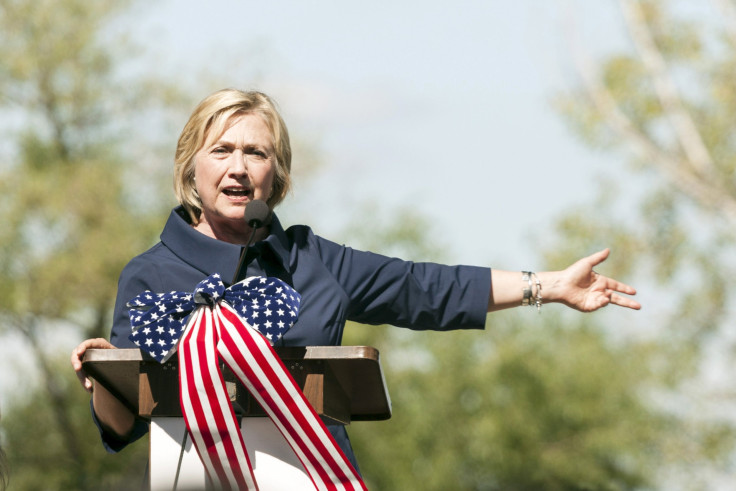Clinton’s New Stance On The Trans-Pacific Partnership Comes As She Woos Powerful, Trade-Skeptical Unions

As with same-sex marriage, the war in Iraq and the Keystone XL pipeline, Hillary Clinton’s thinking on the Trans-Pacific Partnership -- a proposed trade agreement that would link the United States and 11 Pacific Rim countries -- has evolved. Clinton revealed her opposition to the TPP just days after negotiators announced they had reached an agreement.
But until now, the former U.S. secretary of state and presidential candidate declined to share her stance on the deal, which critics call “NAFTA on steroids.” Her new position reflects two closely-related anxieties in Clintonland: a lack of enthusiasm for her campaign from trade-wary and powerful corners of the labor movement as well as the unexpected success of Vermont Sen. Bernie Sanders’ insurgent challenge.
Opposition to free trade deals is a pillar among many private-sector union members, in addition to unorganized workers, especially in manufacturing. As Sanders has surged in the polls, overtaking Clinton in the early primary states of Iowa and New Hampshire, he has repeatedly slammed the TPP, and free trade agreements more broadly. He called the spate of U.S. trade pacts “part of an effort to boost the profits of large corporations and Wall Street by offshoring jobs.”
Clinton, by contrast, has supported many of those very deals. As secretary of state, she publicly touted the TPP 45 times and cables show her agency was closely involved in negotiations. During that time, she also hailed controversial new treaties with South Korea, Colombia and Panama. As first lady, she praised the North American Free Trade Agreement before backtracking during her inaugural Senate bid. And while she did oppose the Central American Free Trade Agreement as senator, she voted for similar deals with Singapore, Chile, Australia, Morocco and Oman.
That record has not impressed many in the labor movement, whose endorsements often translate into substantial financial support and voter mobilization. Union support proved critical in Barack Obama’s 2008 and 2012 victories.
Clinton has captured some major union endorsements, including the two largest teachers’ unions, several building trades unions and the International Association of Machinists. But as her socialist challenger sees steady gains in the polls, other major unions have stayed on the sidelines, including some that fought most aggressively against the TPP: the Communications Workers of America, the International Brotherhood of Teamsters and the United Steelworkers, among others.
“The TPP represents the future and whether the next generation of the middle class survives or not,” said Garry Hubbard, a spokesman for the Steelworkers union, which represents tens of thousands of workers battered over the years by the influx of cheap, foreign steel. “It’s a life or death matter to us and our members.”
Other manufacturing-heavy unions, for whom the painful memories of NAFTA are still fresh, have used similarly harsh language. Bashing the TPP earlier this week, the Teamsters’ Jim Hoffa complained that trade deals “continue to hollow out the manufacturing base of communities and destroy middle-class jobs in their wake.” A fiery statement from the communications workers union struck a similar tone: “Working people know that TPP would be a disaster.”
Estimates vary, but one oft-cited study from the left-leaning Economic Policy Institute pegs the number U.S. job losses from NAFTA at nearly 700,000. About 60 percent of those were in manufacturing -- fields like electronics and auto production.
Clinton’s firmer stance on TPP could leave her better poised to win the support of unions that represent these workers. Indeed, major private-sector unions have yet to officially dive into the primary race.
Last month, the Teamsters announced they would not be endorsing a presidential candidate “at this time.” The Steelworkers have yet to announce if -- or when -- they’ll make a primary endorsement. The Communications Workers union has said it will finish polling members on the subject in early December. In the last election cycle, from 2013 to 2014, these three unions gave a combined $10.2 million to all candidates.
The move could also improve Clinton’s standing at the powerful AFL-CIO, which as a federation needs the support of its constituent unions to make an endorsement. The federation usually waits until the general election to endorse presidential candidates, although it’s not unprecedented to do so beforehand. Democratic candidates all asked for the group’s support earlier this year in private meetings.
As International Business Times reported, Clinton’s ambivalence over TPP was readily apparent to labor leaders in the room. Her pitch for their official blessings came moments after Nobel Prize-winning economist slammed the TPP in no uncertain terms.
“A lot of us are hoping she will come around to a stronger place,” Larry Hanley, the president of the transit union, told IBT at the time. “I’d be lying to you if I told you she’s exactly where we want her to be.”
Her new stance, if seen as authentic, could also help overall interest among the rank-and-file -- especially in the early battleground states where she’s struggling to gain traction. In August, an Iowa labor leader complained about Clinton’s waffling on trade to Bloomberg.
“If Clinton doesn’t start giving positions and is the eventual nominee, I worry about how enthused the members will be,” he said.
© Copyright IBTimes 2024. All rights reserved.





















